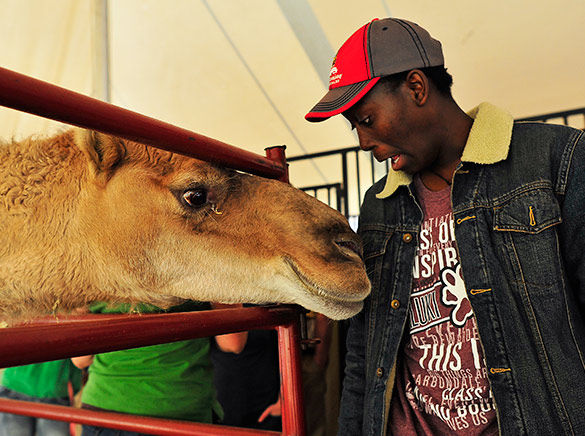Circus brings entertainment, education and protestors

April 13, 2014
As the circus traveled through Carbondale, it brought exotic animals, educational opportunities and activist protests alike.
The Ringling Bros. and Barnum & Bailey Circus stopped at the university from Friday through Sunday as part of its “Super Circus Heroes” tour.
Animal Trainer Cathy Carden, of Springfield, Mo., said the circus consists of 120 people, three camels, two horses, two Shetland ponies, seven miniature horses, 18 dogs and three elephants, two of which she grew up with.
Advertisement
Carden said she has been performing in the circus business since she was five years old and has worked with Ringling Bros. on and off since 1999.
“I come from a family of circus performers, seven generations of circus performers,” she said. “My mother was a trapeze artist. My dad was a bareback rider and when they decided to retire from the physically taxing performing life, they decided to take out their own little circus. That was my dad’s dream and you can’t have a circus without elephants.”
Carden said her mother acquired the elephants from a breeding compound in Thailand. Carden was raised with elephants Patty and Carol, who are now both 40 years old.
The other elephant, 45-year-old Duchess, grew up with Carden’s husband Brett. Each elephant weighs more than 8,000 pounds. Carden said the elephants are not related and live on her farm in Missouri when they are not traveling.
She said her circus works roughly 45 weeks out of the year in each city for one week, performing anywhere from four to seven shows, which usually run Thursday through Sunday. She said each show is two hours long and the elephants perform for about five minutes per show.
She said she was happy to give students and faculty in the Department of Animal Science a behind-the-scenes look, which took place around 12 p.m. Thursday.
“We just basically talked about the animals,” Carden said. “This one young lady was interested in working with elephants and doing maybe an internship.”
Advertisement*
She said some of the things discussed were daily care, such as feeding and cleaning the animals.
“We like to monitor how much they drink. They drink about three or four times a day,” Carden said. “I’ve seen (the elephants) drink 100 gallons of water (a day.)”
Gary Apgar, an associate professor of animal science food and nutrition, said he was glad to see how Ringling Brothers treats their animals.
“It’s neat to hear they actually have a pretty stringent animal welfare and nutritional program that they follow,” Apgar said. “We hear a lot of potentially negative comments about circus shows and it’s really nice to see they’ve got all of their I’s dotted and T’s crossed. It’s reassuring.”
He said people tend to think when animals are moved from one place to the next, they become stressed and lack veterinary treatment.
“She explained everything and all the protocols she goes through on a daily basis, which puts all those concerns at rest,” Apgar said.
Roughly a dozen local protestors expressed some of these concerns outside SIU Arena before several shows throughout the weekend.
Kori Craig, a graduate student in speech language pathology from Manhattan, said she was protesting because she wants people to think about what they are paying for.
“If people question it, I just want them to do their own research and discover that a lot of animal abuse occurs with elephants,” Craig said. “These animals don’t do it by choice, so we have to think what makes a one-ton elephant want to stand on a ball.”
Craig said she protested when Ringling Bros. visited the university in 2012.
Jessica Booth, 33, and Marcus Booth, 51, both of Carbondale, protested alongside their children Gabriel, 8, and Ayla, 6. Jessica said they were protesting because it is morally wrong and not natural to keep animals in cages.
“In my mind, if it’s illegal to keep a dog locked up in a car on a hot day, I think it should be illegal to pull elephants around by hooks and chain them to walls,” she said. “They need to be in the wild.”
Marcus said there are many ways to entertain children and make money that do not involve exploiting animals.
Jessica said even children, such as her son, can tell elephants have emotions.
“I’ve actually seen a live video of an elephant painting a picture of a baby elephant holding a flower,” Gabriel said. “They have feelings.”
Carden said protestors are just another aspect of the business.
“People fear propaganda that’s out there and basically they just buy into that,” she said. “I think they’re basically misinformed. A lot of the agenda for the activists is to separate all animals from humans in all aspects of life. That’s pretty unrealistic in my opinion.”
Carden said her animals are well taken care of and receive veterinary care, exercise and day-to-day human interaction.
“Its job is to survive in the wild,” she said. “When you take that job away, you have to give them something else to think about to stimulate them.”
Advertisement








